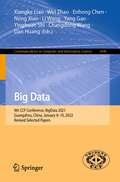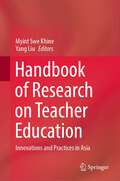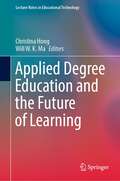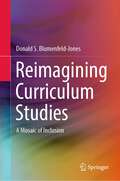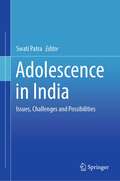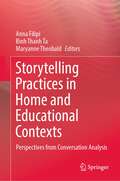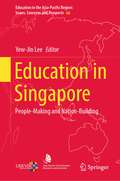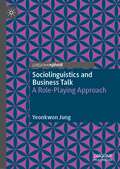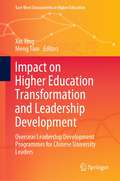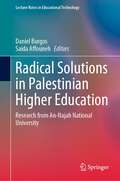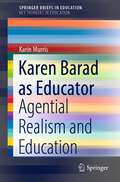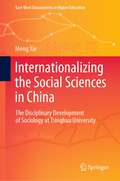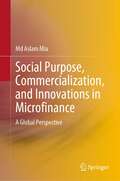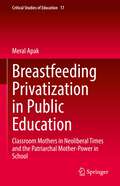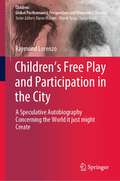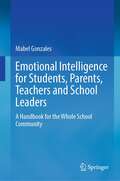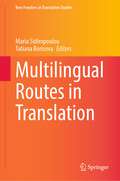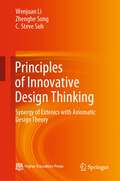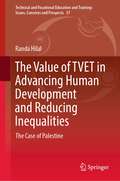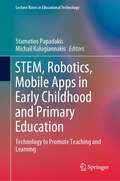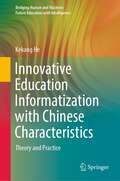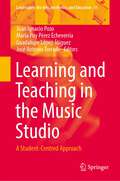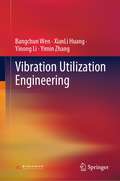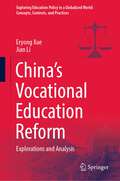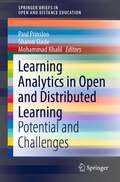- Table View
- List View
Big Data: 9th CCF Conference, BigData 2021, Guangzhou, China, January 8–10, 2022, Revised Selected Papers (Communications in Computer and Information Science #1496)
by Xiangke Liao Wei Zhao Enhong Chen Nong Xiao Li Wang Yang Gao Yinghuan Shi Changdong Wang Dan HuangThis book constitutes the proceedings of the 9th CCF Conference on Big Data, BigData 2021, held in Guangzhou, China, in January 2022. Due to the COVID-19 pandemic BigData 2021 was postponed to 2022. The 21 full papers presented in this volume were carefully reviewed and selected from 66 submissions. They present recent research on theoretical and technical aspects on big data, as well as on digital economy demands in big data applications.
Handbook of Research on Teacher Education: Innovations and Practices in Asia
by Myint Swe Khine Yang LiuThis comprehensive book presents emerging research findings and promising reform practices in the field of teacher education, curriculum, assessment, teaching and learning approaches, pedagogical innovations, and professional development in educating the next generation of globally competent students. It reflects the current trends and highlights contemporary teacher education programs in twenty greater Asian countries and regions. It offers insight into improving teacher education in Singapore, Malaysia, Thailand, Philippines, Vietnam, Cambodia, Laos, Myanmar, Indonesia, Brunei, India, Pakistan, Bangladesh, Bhutan, China, Korea, Taiwan, Japan, Hong Kong, and Macau. The handbook contains chapters written by experienced international teacher educators who draw on their experience and expertise to perennial issues and formidable challenges in teacher preparation and meaningful school reforms. This volume is a valuable resource and essential companion for teacher educators, faculty members, staff developers, trainee teachers, undergraduate and postgraduate students, researchers, school leaders, policy-makers, and professional learning communities to refresh their knowledge and improve their understanding. This book is a must-read for anyone interested in evolving issues in teacher education.
Applied Degree Education and the Future of Learning (Lecture Notes in Educational Technology)
by Christina Hong Will W. K. MaThis book draws on the responses to learning and teaching and applied education futures thinking, that provide insights into the future of learning. It brings together more than 30 novel and important applied research and scholarly contributions from around the world, including Australia, Canada, Finland, Germany, Hong Kong, Japan, Macau, Mainland China, Malaysia, Morocco, Pakistan, and the UK. The chapters, including reflective essays and practice-based case examples, are divided into five major themes:• Future ready values and competencies for the future of work• Innovative pedagogies in applied degree learning and training• Driving student access, engagement, and success through digital technologies• Intelligent technologies: Embedding the new world of work into applied degrees• Lifelong learning, partnering, and the future of workThis book is important for readers interested in international perspectives on the future of work and professional education.
Reimagining Curriculum Studies: A Mosaic of Inclusion
by Donald S. Blumenfeld-JonesThis book addresses the crucial issue of how we value and deploy the idea of “freedom” that underlies contemporary curriculum studies. Whether we are conventional curriculum thinkers who value knowledge development or favor a Deweyan, individualist orientation toward curriculum or are a critical social justice curriculum thinker, at the heart of all these orientations and theorizing is the value of “freedom.” The book addresses “freedom” through novel sources: the work of Martin Buber on education, Julia Kristeva on the uses of imagination and the female/male dialectic, Emmanuel Levinas’ unique approach to ethics, and more. Readers will find new ways to understand freedom and the world of ethical life as informing curriculum thinking. It provides a more ecumenical vision that can draw our differences together. It helps readers to reconsider ourselves in fruitful ways that can bring more relevance and substance to the field.
Adolescence in India: Issues, Challenges and Possibilities
by Swati PatraThis book provides a comprehensive, in-depth and practical approach towards an understanding of the multitude challenges of adolescence in India. Going beyond the traditional ‘storm, stress and strain’ view of adolescents, it focuses on the strengths of adolescents and highlights a community approach towards an understanding of adolescents. The book is divided into three sections. Section 1 introduces the concept of adolescence in the Indian context, discusses the identity development and peer relations in adolescents. Section 2 deliberates on issues and challenges such as depression, suicide, violence, substance use and behavioural addiction, keeping in mind the Indian socio-cultural context. It also highlights concerns of adolescents related to disabilities. Section 3 provides various prevention and intervention measures including both individual-based and group-based interventions to deal with these challenges, thereby facilitating the journey of adolescents. It helps the reader to focus on the positive development of the adolescents. The book is useful for students in psychology, education, counselling, mental health and development. It is also a great resource book for professionals working in the field of health in general and mental health in particular.
Storytelling Practices in Home and Educational Contexts: Perspectives from Conversation Analysis
by Maryanne Theobald Anna Filipi Binh Thanh TaThis book brings together researchers from across the globe to share their work on the micro-analyses of storytelling. By doing so, the book helps to deepen the understanding of, and track storytelling practices cross-culturally and longitudinally in the home, at school, and in higher education. Through the unique focus on education and learning, this book provides a lens with which to identify how children’s and adolescents’ language development and sense of self in storytelling are supported in various contexts: the home, classroom, playground or in the higher education context. It explores the work, identity and practices of friends, teachers and lecturers in teaching, learning, reflection and supervision. Importantly, in identifying these practices, the book presents opportunities to assist parents and teachers, to inform pedagogy in teacher education, and to support effective doctoral supervision. The focus on storytelling in homes, education, and for learning, and the practical applications of the findings, contribute to the ongoing research in both education and conversation analysis. Chapter 8 is available open access under a Creative Commons Attribution 4.0 International License via link.springer.com.
Education in Singapore: People-Making and Nation-Building (Education in the Asia-Pacific Region: Issues, Concerns and Prospects #66)
by Yew-Jin LeeThis edited book is a comprehensive resource for understanding the history as well as the current status of educational practices in Singapore. It is a one-stop reference guide to education and educational issues/concerns here. There are three sections: Part 1 provides a sectorial overview of how education has been organized in this country such as preschool, special needs, primary and secondary, and adult education divisions. In Part 2, contributors critically delve into issues and policies that are pertinent to understanding education here such as underachievement, leadership, language education, assessment, and meritocracy to question what Part 1 might have taken for granted. Part 3 contains the largest number of contributors because it offers a scholarly examination into specific subject histories. This section stands out because of the comparative rarity of its subject matter (history of Physical Education, Art, Music, Geography Education, etc.) in Singapore.
Sociolinguistics and Business Talk: A Role-Playing Approach
by Yeonkwon JungThis book delivers essential skills in “spoken” professional communications, presenting theoretical and applied frameworks for business talk using English as a lingua franca. Adopting a role-playing approach mimicking various professional settings, it assesses the strength of the well-reasoned argument, the logical links that convince the audience of the coherence of the speaker’s argument and the necessary linguistics competencies. This book centers on a variety of situations that commonly take place in business organizations (such as relational talk; call center talk; job application talk) and addresses key skills such as conflict resolution and collaborative problem solving through communication, which are key for both students and practitioners. In addition it analyses spoken business discourse data with the four main sources of communicative competence: grammatical competence, discourse competence, sociolinguistic competence and strategic competence in order to highlight how they are used in business speaking practices.
Impact on Higher Education Transformation and Leadership Development: Overseas Leadership Development Programmes for Chinese University Leaders (East-West Crosscurrents in Higher Education)
by Xin Xing Meng TianThis book studies impact of “Overseas Leadership Development Programmes for Chinese University Leaders in the Central and Western Regions of China,” a research project funded by National Office for Education Sciences Planning (No. CIA170270), China. It is intended to enhance university leaders’ professionalism and to achieve impact on both the individual and institutional levels. The empirical data was collected using a mixed-methods approach including policy documents, learning diaries, a quantitative survey, and individual interviews. From the standpoint of transnational education, the book scrutinizes the context of the Chinese higher education governance system, the provision of overseas leadership development programmes, the needs of Chinese university leaders, the leadership development impact on the university leaders’ personal views regarding leadership, and its impact on institutional development and change. The book also addresses the challenges faced by these leaders when implementing the changes after their leadership development sections, explaining how these leadership development sections met or failed to meet the national goals of promoting innovation and social justice in university leaders’ work.The findings presented here will greatly enrich readers’ knowledge concerning Chinese university leaders’ professionalism and professional development. Further, the respective chapters provide evidence-based recommendations for educational practitioners, policymakers, overseas trainers, and researchers who are interested in developing university leaders’ professionalism through targeted leadership development, making the book a valuable resource for leadership development, policymaking, and further educational research.
Radical Solutions in Palestinian Higher Education: Research from An-Najah National University (Lecture Notes in Educational Technology)
by Daniel Burgos Saida AffounehThis book brings together education research and practice carried out by An-Najah National University, a lead Higher Institution in Palestine that managed to move from a face-to-face setting to a fully online learning and teaching environment during the initial COVID-19 outbreak, within a month, seamlessly, which makes a success cases study of virtualization. This book concentrates on approaches to ensure the continuous improvement and quality of higher education provision across the country, with particular focus on: a) learning and teaching methodologies in online settings; b) use of open education as a key resource; and c) development of academic capability building, along with academic and knowledge exchange with other higher education partners. Innovative ideas, best practices, and comparative case studies are presented, discussed, and compared with international ones to make specific recommendations for a successful and sustainable implementation.
Karen Barad as Educator: Agential Realism and Education (SpringerBriefs in Education)
by Karin MurrisThis book is about becoming touched and moved by Karen Barad’s agential realism. Karen Barad as Educator is not biographical. It is not about Barad. There is much to be learned about teaching and education research through the human and other-than-human narrative characters in Barad’s writings and way of life. Reading this book is about becoming entangled with, and being inspired by, a passionate yearning for a radical reconfiguration of education in all its settings and phases (e.g., day-care centres, schools, colleges, universities, but also homes, museums or therapy rooms). This book will appeal to lecturers, teachers, artists, therapists, parents and grandparents, funders of education research, organisers of educational events, as well as detached youth workers. In short, this book will speak to anyone interested in the ‘what’ and the ‘how’ of educational encounters and who is interested in alternatives to the dominant neoliberal national curricula, educational policies and humanist teaching, research, and conference agendas. The book aims to offer a gripping account for educators to be inspired by the invigorating and elusive philosophy of agential realism with a specific focus on iterative performative practices that profoundly matter to what counts as knowledge, teaching, learning and response-able education science.
Internationalizing the Social Sciences in China: The Disciplinary Development of Sociology at Tsinghua University (East-West Crosscurrents in Higher Education)
by Meng XieThe current social reality and changing global forces and spaces are inspiring the rethinking, refining, and re-empowering of the world social sciences to broach the frontiers of human knowledge, enhance mutual understanding across cultures and civilizations, and shape a better world. Taking Tsinghua University’s sociology as a case, this book concentrates on how internationalization shapes disciplinary development in a global context of asymmetrical academic relations. This inquiry is set amidst China’s dramatic economic, social, political, and cultural transformations, as well as the institutional reforms in this Chinese flagship university. This book seeks to probe how Chinese and Western knowledge, institutions, and cultures are integrated in the ongoing process of internationalization and concentrates on the disciplinary evolution of Tsinghua’s sociology—intellectually, institutionally, and culturally—drawing on top-down higher education policy and bottom-up perceptions and experiences of Tsinghua’s social scientists. This book highlights that higher education internationalization is an evolving process whose advanced phase would require Chinese social scientists to bring China to the world. It is time for Tsinghua University to reassess the long-term impact of internationalization on its academic disciplines and provide sufficient support for the development of the social sciences.This book will attract academics, practitioners, and postgraduate students interested in higher education internationalization, international academic relations, global constellation and distribution of academic power, academic knowledge production, and the development and intellectual influences of the Chinese social sciences.
Social Purpose, Commercialization, and Innovations in Microfinance: A Global Perspective
by Md Aslam MiaThis book analyses three key aspects of microfinancing, namely social purpose, commercialization and innovations and examines, through a global perspective, how these aspects helped and diverted microfinance institutions towards the attainment of their dual goals over the last twenty years. Since microfinance remains informal in nature for most economies, not all financial innovations are suitable for its needs. Hence, the arguments in the book put forth an important challenge to the advocates of innovations and subsequently highlight why MFIs should be cautious when integrating innovations to ensure its original promise. The book is based on empirical analysis by utilising the latest and global microfinance market data, rather than focusing on a specific region. Thus, the book bridges a gap in knowledge by unravelling detail of the social purpose, commercialization and innovations within the field of microfinance and will be a valuable resource for those exploring the dynamics of innovations in microfinance.
Breastfeeding Privatization in Public Education: Classroom Mothers in Neoliberal Times and the Patriarchal Mother-Power in School (Critical Studies of Education #17)
by Meral ApakThis book unveils women’s empowerment as mothers as a notion in the school system that reinforces patriarchy rather than weakening it. It discusses how empowerment is a contested notion, even though it is mostly praised in terms of women’s emancipation. This book explores the concept that although women are breastfeeding education as mothers in the neoliberal education system, they are not necessarily doing so as a self-sacrifice as one may generalize in the context of neoliberal economy. Instead, this book argues that women are doing this as a means of investment for gaining a sense of individual power, which ironically, reinforces patriarchal values. It presents demonstrative and descriptive practical incidences in the field.
Children’s Free Play and Participation in the City: A Speculative Autobiography Concerning the World it just might Create (Children: Global Posthumanist Perspectives and Materialist Theories)
by Raymond LorenzoThis book presents an interplay of imaginative memoir-telling, action research data and future projection that reminds and inspires experiences academics, researchers, professionals, as well as a wider public to recognize the fundamental importance and the impellent need for more and better work in favour of true political and societal recognition of the needs and rights of children to play freely, to participate, to live fully and enjoy their neighbourhoods and cities, and to imagine and construct alternative futures, together with adults. The book's abundant spoken dialogue is, in effect, storytelling between children (and youth) on their own and with adults (especially the elderly). It conveys an appreciation of children’s special capacities to think critically about their everyday places—and the greater world around them—and to develop solutions (or ‘projects’) for the problems they identify. This book serves an effective catalyst for stimulating rich discussion of the theoretical and practical bases of the many themes, or areas of study, which are treated in the story.
Emotional Intelligence for Students, Parents, Teachers and School Leaders: A Handbook for the Whole School Community
by Mabel GonzalesThis book heightens readers’ awareness of the importance of emotional intelligence and how it impacts our lives. It inspires parents, teachers and school leaders to learn more about emotional intelligence as a process of self-improvement, relational skills, and to help our students to develop emotional intelligence from an early stage of their lives. There are four parts in the book. Part 1 explains the importance of emotional intelligence in every aspect of our lives. It presents models and theories of emotional intelligence and explains how our emotions control our mind, body and spirit. Part 2 gives insights into how emotions play a significant role in our relationships with others. Part 3 takes the reader from family to the workplace and highlights the importance of becoming more aware of our emotions at work and how we relate to others. Part 4 emphasises the importance of helping our students to develop essential emotional intelligence to face this increasingly complex and challenging world.
Multilingual Routes in Translation (New Frontiers in Translation Studies)
by Maria Sidiropoulou Tatiana BorisovaThis book tackles the interface between translation and pragmatics. It comprises case studies in English, Greek, Russian and Chinese translation practice, which highlight the potential of translation to interact with pragmatics and reshape meaning making in a target language in various pragmatically relevant ways. Fiction and non-fiction genres merge to suggest a rich inventory of interlingual transfer instances which can broaden our perception of what may be shifting in translation transfer. Authors use an emic approach (in addition to an etic one) to confirm results which they often present graphically. The book has a didactic perspective in that it shows how pragmatic awareness can regulate translator behaviour and is also useful in foreign language teaching, because it shows how important implicit knowledge can be, in shaping the message in a foreign language.
Principles of Innovative Design Thinking: Synergy of Extenics with Axiomatic Design Theory
by Wenjuan Li Zhenghe Song C. Steve SuhThe book presents a comprehensive treatment on a novel design theory that fosters innovative thinking and creativity essential for addressing wicked problems. Wicked problems are ill-defined, ambiguous in both aims and solutions, and complex with interconnected and intertwined (coupled) factors. While being ubiquitous and difficult, however, wicked problems share characteristics common to science and design in three regards, namely agent finitude, system complexity, and problem normativity. These fundamental attributes allow a core cognitive process common to design and science to be identified and a strategic problem-solving conception of methodology be formulated as a result. The theory facilitates new opportunities for synergetic cross-disciplinary research and practice by incorporating the essences of Extenics to axiomatic design. Innovative thinking is enabled by exploring Extenics for problem reframing, paradigm shift, and abductive reasoning and by engaging axiomatic design in the co-evolution (iteration) of the need and viable design concept. The theory is unique in that it is a framework for quantifying imprecise and vague design information available during the conceptual design stage as mathematical expression and algorithm early in the design effort and enables the objective evaluation and emergence of an optimal design concept from among multitude of viable ones. The book is conceived for students and real-world practitioners in engineering, natural and social sciences, business, and fine arts who seek to develop powerful design thinking for solving problems in a creative and innovative way.
The Value of TVET in Advancing Human Development and Reducing Inequalities: The Case of Palestine (Technical and Vocational Education and Training: Issues, Concerns and Prospects #37)
by Randa HilalThis book examines the contribution of Vocational Education and Training to advancing human development and reducing inequality. It uses the example of Palestine as case-study rich in multi-layered inequalities, some of which are experienced in the region and worldwide, while others are specific to adverse conditions. The case of Palestine provides fertile ground for understanding inequality and human development, and for echoing the developed knowledge through to the understanding of Vocational Education and Training and Human Development globally. The book brings original theoretical approaches, evidence of the value of Vocational Education and Training, and contributes to academic debates, as well as provides empirical evidence for practitioners and donor community.
STEM, Robotics, Mobile Apps in Early Childhood and Primary Education: Technology to Promote Teaching and Learning (Lecture Notes in Educational Technology)
by Stamatios Papadakis Michail KalogiannakisThis book brings together a collection of work from around the world in order to consider effective STEM, robotics, mobile apps education from a range of perspectives. It presents valuable perspectives—both practical and theoretical—that enrich the current STEM, robotics, mobile apps education agenda. As such, the book makes a substantial contribution to the literature and outlines the key challenges in research, policy, and practice for STEM education, from early childhood through to the first school age education. The audience for the book includes college students, teachers of young children, college and university faculty, and professionals from fields other than education who are unified by their commitment to the care and education of young children.
Innovative Education Informatization with Chinese Characteristics: Theory and Practice (Bridging Human and Machine: Future Education with Intelligence)
by Kekang HeThis book contains the research of Innovative Education Informatization conducted by researchers from School of Educational Technology, Beijing Normal University since early 1990s. There are three main parts of the book. The first part is about six pillars supporting the theory of Innovative Education Informatization with Chinese Characteristics. Six theories are: 1) Theory of Creative Thinking, 2) New Constructivism, 3) Theory of In-depth Integration of Information Technology and Subjects Teaching, 4) New Theory of Teaching Design, 5) Theory of Children’s Thinking Development, and 6) Language Sense Theory. The second part pays attention to advocating maker education system with Chinese characteristics. The third part focuses on Chinese-style flipped classroom. The book will have profound impact on education informatization.
Learning and Teaching in the Music Studio: A Student-Centred Approach (Landscapes: the Arts, Aesthetics, and Education #31)
by Juan Ignacio Pozo María Puy Pérez Echeverría Guadalupe López-Íñiguez José Antonio TorradoThis book advocates for a radical change in music teaching and learning methods, allowing for a break from the traditional conservatory model still in use in many classrooms. The product of twenty years of interdisciplinary work by musicians, music teachers, and psychologists, the book proposes to place the focus of music education on the students themselves and on their mental and physical activity, with the aim of helping them to manage their own goals and emotions. This alternative is based on a new theoretical framework, as well as numerous real, concrete examples of how to put it into practice with students of different ages and in different environments. This book focuses primarily on teaching instrumental music, but its content will be useful for any teacher, student, musician, or researcher interested in improving music education in any environment, whether formal or informal, in which it takes placeChapters 3, 4, 6 and 18 are available open access under a Creative Commons Attribution 4.0 International License via link.springer.com.
Vibration Utilization Engineering
by Bangchun Wen XianLi Huang Yinong Li Yimin ZhangThis book proposes “Vibration Utilization Engineering,” using harmful vibrations in many cases for energy harvesting. Scope of the book includes, but not limited to, linear and nonlinear system of vibrations, waves (sound wave and light wave), wave motion and energy utilization, the electric–magnetic oscillation utilization in engineering, the phenomena, patterns, and utilization of the vibrations in Nature and human social society. It is all based on the theory of vibration utilization technology and equipment technological process, linear and pseudo-linear vibration, nonlinear vibration. This new subject branch is closely associated with numerus applications in industrial or agricultural production, medical apparatus and equipment and daily life, etc. It could create significant economic and social benefits and provide significant values for society and excellent service for human life.
China’s Vocational Education Reform: Explorations and Analysis (Exploring Education Policy in a Globalized World: Concepts, Contexts, and Practices)
by Eryong Xue Jian LiThis book explores the holistic development of vocational education in Chinese education system. It investigates the vocational education policy development, student development, allocation of teachers’ resources, financial mechanism and system, students’ financial aid, examination and enrollment, private vocational education system, and school-enterprise cooperation. In addition, this book critically examines and epitomizes the contextualized China’s vocational education reform from multiple dimensions. This book also offers an in-depth explorations and analysis of current Chinese vocational education reform comprehensively. This is a highly informative and carefully presented book, providing academic insight for scholars and researchers who are interested and work in research on China’s vocational education reform in China as well as the administrators and stakeholders in Chinese education system and graduate students who majoring in the field of educational policy.
Learning Analytics in Open and Distributed Learning: Potential and Challenges (SpringerBriefs in Education)
by Paul Prinsloo Sharon Slade Mohammad KhalilThis book explores and further expands on the rich history of theoretical and empirical research in open and distributed learning, and addresses the impact of the “data revolution” and the emergence of learning analytics on this increasingly diverse form of educational delivery. Following an introductory chapter that maps the book’s conceptual rationale, the book discusses the potential, challenges and practices of learning analytics in various open and distributed contexts. A concluding chapter briefly summarises the chapters before providing a tentative future research agenda for learning analytics in open and distributed environments.
